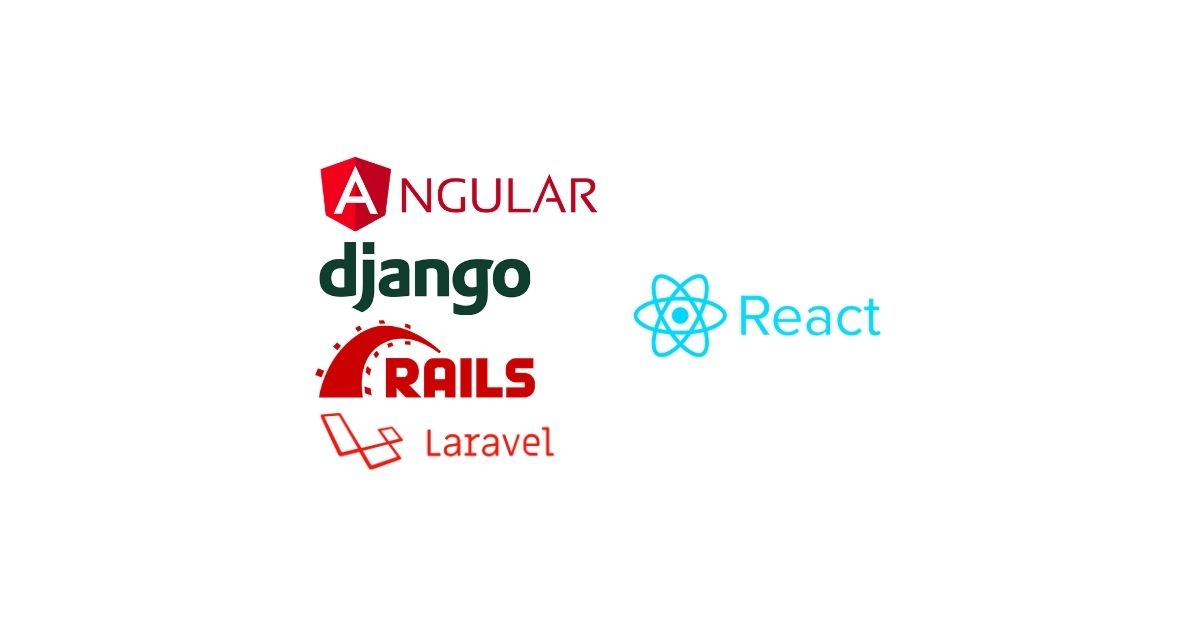Refactoring your legacy app? Building new features for your application? Need new APIs? Microservices? You need development technologies that can build scalable web products, the tech that fits your existing enterprise infrastructure, the tech that is highly customizable to suit your future needs. An identifiable attribute of these scalable technologies is that they are:
“Always under development, releasing security patches, new features, and can be easily integrated with other technologies“.
Based on our rich experience of working with companies like 3M, Cisco, Siemens, Microsoft, Byju’s, Zomato, and other enterprises, we’ve come up with this list of 5 web development frameworks. The intent is to make the decision-making easy for you in choosing the right one for your application/idea.
5 stellar web development frameworks in 2021-
- Django
- React
- Angular
- Ruby on Rails (RoR)
- Laravel
Django: Python-based full-stack web application development framework
With 55.5k+ Github Stars, Django is one of the most popular, open-source web development frameworks in 2021. It’s a
- High-level framework for building web applications
- Ships with all-batteries-loaded.
Why should you consider Django for your web application development in 2021?
Django follows the model-template-view (MTV) architecture and is primarily used to build ridiculously fast database-centered applications. It’s a ridiculously fast approach to building web applications with a focus on the “don’t repeat yourself” coding style.
Django benefits that make it an awesome web development framework?
Django provides a set of libraries with pre-built features that are highly customizable or which can be built upon to serve your niche use-case. We list below a few of them:
- Django provides tools for caching, logging authentication, pagination, serialization, sessions management, sitemaps, syndicating feeds, etc.,
- Django also has a set of built-in signals which are the implementation of a set of senders and receivers to allow decoupled application components to get notified about actions in some other application components.
- Additional core functionalities of Django includes “conditional rendering of content, page redirecting”
- Creating location-based services, geographic web applications is a cakewalk in Django. It has a geoDjango contrib module with features to create Django model fields for OGC geometries and raster data, a high-level python interface of GIS geometry, raster operations, and data manipulation.
Where Django Can Be Used?
Django is in use by companies like Coursera, Pinterest, Udemy, Robinhood, Accenture, BitPanda, and 2231 other companies. On a high-level, you can leverage Django for building:
- Multimedia Streaming Platforms [ed-tech, video-sharing]
- Ecommerce Marketplaces
- Social Media Networks
- Banking Applications
- APIs, etcetera
ReactJs: JavaScript-based Web & Mobile UI Development Library
ReactJs is a component-based, declarative-style, open-source UI/UX development technology. React is a library developed & maintained by Facebook. The react community is 5.8M strong and boasts 1500+ contributors on Github. With 164k+ stars, it is one of the most popular JS-based UI/UX libraries. MERN is a highly popular ReactJs based development stack for building SaaS products.
Why Should You Consider ReactJS For Your Web Application Development In 2021?
Businesses need to be agile in 2021, and react empowers you to achieve the same. React enables web development teams to build:
- highly secure & scalable cross-platform applications.
- high-performing applications with quick time to market.
ReactJS benefits that make it an awesome web development library?
ReactJs features can be bulleted as:
- Cost-efficient, easily maintainable, secure development
ReactJs is open-source, basically free. Also, it is agile-friendly by nature, and thus pretty easy to develop iteratively. You can easily incorporate best security practices like
- incorporating HTTP authentication
- rate limit your APIs to protect against DDoS attacks
- Use createElement() API or JSX’s auto escape features to safeguard against XSS attacks, and so on.
- High performance, Server-side rendering
Server-side rendering, CSS animations, Gzip compression, throttling & debouncing, memoizing react components, react.Fragments, react stateless components, etcetera can be leveraged to build high-performing reactJS powered web applications.
- Easy debugging
React Js is a painless UI/UX development library. A factor that complements this is the easy debugging feature i.e., reacts dev tools. You can filter & search components, view the indented hierarchy of components while debugging react applications. The latest releases have support for hooks, suspense toggle, reload and profile too for easy debugging of web applications built with react.
- Code reusability, Shared-codebase for web & mobile, cross-platform
ReactJs is a component-based web development library. Component “states & props” are at the heart of how to react applications are built. These components, if built the right way are usable anywhere in the application (where it is required). This reusability results in faster development and quick time to market. Businesses are left with ample time to experiment with the product and improvise/release features quickly.
Where ReactJs Can Be Used?
Uber, Airbnb, Facebook, Netflix, Pinterest, Instagram, Shopify, Amazon, Twitter, and 9373 other companies are using ReactJs. In short, ReactJs can be used to build:
- Static marketing-focused websites
- Social media platforms
- Aggregator applications
- Ecommerce applications, and so on..
Angular – Typescript/JavaScript based Web Development Framework
Angular is a web application development framework released in 2010 by Google. It’s still under development by team Google and an open-source community of 1340+ members. On Github it enjoys huge popularity with 71k+ stars, and also boasts 1.7m users. MEAN stack is one of the most popular angular-centric web development stacks for building enterprise applications.
Why Should You Consider AngularJS For Your Web Application Development In 2021?
Angular powers some of the largest Google applications. It’s a great framework to code once and builds applications for the web as well as mobile web, native mobile apps, and desktop applications. With angular you can build:
- Modern web applications with great performance
- Deliver app like experiences
Angular benefits that make it an awesome web development framework?
Angular benefits can be bulleted as:
- Cross-platform, High performance
Angular enables you to develop cross-platform apps – progressive web apps, native apps using the strategies from Cordova, NativeScript, etc., and desktop apps. You can leverage/access native OS-specific APIs to fully utilize the platform. Angular converts your templates into highly optimized code to run efficiently on modern javascript virtual machines. Code generation, code splitting, and instant rendering techniques power high-performance applications. All this with the productivity of an open-source framework i.e., quick development, ability to use pre-existing libraries, and great community support.
- Easy Debugging with AUGURY
Augury is a Google Chrome Dev Tools extension for debugging Angular applications. Here are some other resources for angular development tools, data libraries, cross-platform development tools, UI component libraries, etc.,
- MVC architecture, Modules, Templates, Components, Dependency Injection
Angular application is made up of several components, which are organized as NgModules. The component defines views and uses services to render the application. There is a root component (module) and many feature components. The root module is responsible for bootstrapping the application. Services can be injected within the components. This makes it possible to use the same component for rendering different views. For a detailed explanation of angular concepts, and when it suits your application development requirements, read our detailed insight on Angular.
Where Angular Can Be Used?
Google, Bitpanda, PostClick, Armut and 700+ popular companies are using angular-2. Angular-2 can be used to develop:
- Media streaming websites
- SEO optimized marketing websites
- Single page web applications
- Healthcare platforms, and so on..
RoR – Server-side web application framework
Ruby on Rails (RoR) is a server-side web application framework written in Ruby. Rails make it possible to easily build highly scalable, MVC architectured web applications. It boasts 47k+ stars on Github and 4k+ contributors. RoR has 1.7m users.
Why Should You Consider Rails For Your Web Application Development In 2021?
RoR has been a controversial framework because of scalability issues. Twitter shifted from Ruby to Scala in 2011 citing performance & scalability issues. But Ruby continued to rise and inspire multiple other frameworks like Django, Yii, Catalyst, etc., It is in use by major organizations like Airbnb, Instacart, Github, Paytm, Fiverr, etc., and powering up highly scalable apps.
RoR benefits that make it an awesome web development framework?
RoR benefits can be bulleted as:
- Action model, action pack, action view
Active record class allows RoR developers to access data from the database and present it based on the business logic. Action pack is for handling HTTP requests, and Action View is for the proper aesthetic representation of processed data queries.
- Rich set of libraries
Active record, action mailer, action mailbox, active job, action cable, active storage, action text, active support, and a collection of libraries extensions powers rails applications to facilitate handling of emails, rich texts, uploading/attaching files, integrating web sockets, natively within the RoR application.
- Open-source, Software engineering patterns & paradigms
RoR like the other 4 frameworks in this listicle is an open-source web development framework. It’s full-stack and thus great for building lightweight MVP applications. Besides MVC, Rails also evangelizes the paradigms like convention over configuration (CoC), don’t repeat yourself (DRY), etc.,
Where R-o-R Can Be Used?
Basecamp, Hey, Github, Shopify, Airbnb, Twitch, SoundCloud, Hulu, Zendesk, Square, and 3.2k+ other companies use Rails. Rails can be used to develop:
- Aggregator & booking platforms
- eCommerce marketplace apps
- Media-streaming websites
- Enterprise SaaS applications, and so on..
Laravel – PHP web application development framework
Laravel is the last framework in our list of 5 stellar web development frameworks in 2021. It’s a PHP-based framework for web development. Laravel’s huge community, the popularity of PHP, and the rich feature set of this framework make it highly popular in the dev networks. Laravel framework has garnered 64k+ stars on GitHub and ranks 7 on PHP Benchmarks.
Why Should You Consider Laravel For Your Web Application Development In 2021?
Laravel is open-sourced i.e., free to use, has a huge community of 500+ members who are actively contributing to its continuous development. What makes it stand-out from many other frameworks is extensive documentation and LTS support for older versions. Laravel 8 is the latest version of the framework and version 6 is under LTS support.
Laravel benefits that make it an awesome web development framework?
Laravel benefits can be bulleted as:
- MVC, Performance, Packages
Like Angular, Rails, Django, etc., you can build secure MVC architectured web applications using Laravel too! For faster development, time-to-market, and best utilization of developer time you can use first-party Laravel packages like Envoy, Passport, Horizon, Cashier, JetStream, and Fortify. For better performance, optimize garbage collection and leverage session, as well as cached cookies.
- Off-the-shelf features
- Built-in access management for authentication and authorization
- Integrable with Amazon SES, Sendmail, etc.,
- Eloquent ORM for data-type agnostic database operations
- Packalyst – a collection of packages for PHP Laravel framework
Where Laravel Can Be Used?
Mastercard, Razorpay, 9Gag, TransferGo, Deloitte, Hubble, and 3000+ popular companies make use of Laravel for building powerful web applications.
- Banking applications
- Healthcare apps
- Social media networks
- Ecommerce platforms, etcetera
Conclusion
In this insight, we took a high-level look at the top 5 web development frameworks including Django (Python), React & Angular (Javascript), Ruby-on-Rails (Ruby) & Laravel (PHP). If you adhere to the best practices and paradigms of the software engineering world, any of these can be leveraged to build highly scalable, secure, robust web applications in 2021. If you seek the help of tech ninjas at Codewave in
- navigating the digital world,
- unlocking business agility, and
- Identify & tap into new revenue & profit sources
Then feel free to ping us at contact Codewave. IT outsourcing accounted for 66Bn+ in 2020. Your peers are outsourcing IT requirements, to experiment and adapt to the new digital world. Outsourcing gives you the added benefit of leveraging the experience, and talent of IT professionals who have been building high-performing applications for years. Stay in touch on Linkedin for the latest in design, tech, & culture if you’re on a mission to build a filthy successful organization, and impact millions of lives.
Frequently asked questions (FAQs)
1. What are web development frameworks?
Web development frameworks are software libraries that provide a structure for developing web applications. They help developers build web applications quickly and efficiently by providing pre-written code for common tasks.
2. What are some popular web development frameworks & libraries?
Some popular web development frameworks & libraries include:
- Ruby on Rails (RoR)
- Express.js
- ReactJs
- AngularJs
- Django
- Flask (Python)
- Laravel (PHP)
- Spring (Java)
- ASP.NET (C#)
3. What are the advantages of using a web development framework?
- Provides a template/skeleton for developing web applications, hence quick time to market.
- Increases development speed and efficiency
- Offers pre-written code for common tasks
- Improves the maintainability and scalability of the application
- Enhances the security of the application by addressing common vulnerabilities
4. How do I choose the right web development framework for my project?
When choosing a web development framework, it is important to consider factors such as the specific requirements of your project, the skillset of your development team, and the popularity and support of the framework.
Codewave is a design thinking led digital transformation company enabling organisations with playful innovation using AI & ML, IoT & Edge, AR, VR, Cloud, Blockchain, and Data.







